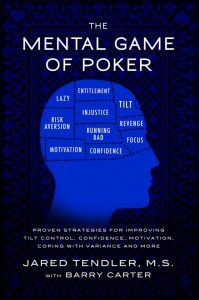 I just finished reading the latest poker book from D&B Publishing, Positive Poker, by Dr. Patricia Cardner and Jonathan Little –Positive Poker is the latest offering in the fairly new genre of poker psychology books– and one thought kept crossing my mind: Why has it taken so long for this market to emerge in poker?
I just finished reading the latest poker book from D&B Publishing, Positive Poker, by Dr. Patricia Cardner and Jonathan Little –Positive Poker is the latest offering in the fairly new genre of poker psychology books– and one thought kept crossing my mind: Why has it taken so long for this market to emerge in poker?
Below you’ll find my thoughts on these “mindset,” “psychology,” “mental game,” or whatever you want to call them books, and why they are long overdue.
The Predecessors to “Mindset” books
Poker books focusing on the mental side of the game are not necessarily a new thing; Dr. Alan Schoonmacher has been writing these kinds of books for years now, and other offerings like Zen and the Art of Poker were always highly regarded among players. So, while the mixing of poker and psychology may not be a new thing, what is new is the new focus on sport and performance psychology, and the use of scientific studies and consultant/coaching techniques.
The older psychology books were more anecdotal in nature, and offered up more generalized advice along the lines of The Art of War; basically a bunch of sage like wisdom that looks more profound when it falls out of a fortune cookie –which I refer to as the original Twitter.
Here is a look at the more recent offerings that are shaping this new mindset genre:
Elements of Poker
Tommy Angelo’s Elements of Poker was the bridge from the old “avoid tilt” and, “this is why your opponent’s play passively,” type books to the new modern poker mindset and psychology books of today.
Angelo still used anecdotal evidence, but for the first time someone was looking at the topic from the viewpoint of a poker/life coach, and trying to build a player’s mental approach to the game instead of just saying, “this is what you should be doing.”
Treat Your Poker Like a Business
This isn’t exactly a mindset book per se, but it’s much closer to that genre than it is to a strategy book. Dusty Schmidt’s seminal work probably wasn’t even intended to be a mindset book, but this collection of leakbusters is a great introduction to the type of mindset a successful poker player needs to have.
The Mental Game of Poker Volume 1 and 2
When I first read Jared Tendler’s Mental Game of Poker my jaw literally hit the floor –the same with volume 2. It was probably the first time in at least five years where I read a “poker book” and found myself really learning something –no offense intended to the authors of the poker primers I often read.
Mental Game is a combination of the latest mindset studies, behavioral and brain science, AND has the distinction of being written by a man whose mental game coaching features dozens of successful poker players.
If you told me up front what I would learn from the Mental Game of Poker (volume 1 and/or 2) I would be willing to shell out a couple hundred bucks for it. So with a reasonable price-tag or about $20-$25 each on Amazon, it’s almost like stealing the advice.
Positive Poker
Take out the coaching angle of Mental Game of Poker and add in more scientific research studies and you have Positive Poker. The author, Dr. Patricia Cardner lacks the coaching experience of Jared Tendler, but she makes up for it with some extra research studies, and covers a bit more ground, albeit not quite as in-depth as the more focused TMGoP.
Why these books are superior to Poker Primers
Let me start off by saying that I have nothing against your typical poker strategy book; as I feel they offer a cheap way for new players to immerse themselves in the basics of poker strategy. But there is a fatal flaw with most poker primers that doesn’t come into play with legitimate mindset books: There is only so much you can cover in 300 pages.
The information in poker primers can be found online by visiting any poker forum and talking with players, and it will be more pointed and in-depth. Sure it will take you a lot longer to piece together all of the different information, but in the end you’ll come away with a better education than a typical poker strategy book can offer.
But a mindset book is different (assuming the author isn’t some quack) in that you can’t just pop on a psychology forum and find information about self control and poker-related goal-setting. The combination of psychologist and poker coach is a highly specialized field. Not to mention that each player’s mental game flaws are more individualized than a simple lack of understanding position or calculating pot odds.
The only other opportunity you’d have to piece together the information offered in the books mentioned above would be to buy about five or six books like Thinking Fast and Slow, Brain Rules, and The Invisible Gorilla, and then spend countless hours trying to cross-pollinate the information you have just read into the poker world.
Success in poker is dependent on two things: knowing the strategies and mastering the mental aspects of the game. But for whatever reason players almost exclusively focus on only the first part. If they are truly serious about the game poker players should devour these mindset books, and even pickup the more generalized titles I just mentioned.
100% up to $3,000 Bonus
Bovada is our most recommended ONLINE CASINO and POKER ROOM for US players with excellent deposit options. Get your 100% signup bonus today.


Leave a Reply
You must be logged in to post a comment.